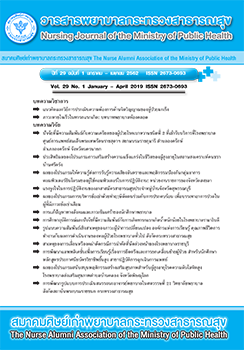The Model Development of an Assessment of Nurse Educator Competencies for 21st Century among Nursing Colleges under Praboromarajchanok Institute for Health Workforce Development, Ministry of Public Health
Main Article Content
Abstract
This research and development study aimed to 1) develop an assessment model of nurse educator competency for 21st century and 2) examine the effectiveness of the assessment model of nurse educator competency for 21st century among nursing colleges under Praboromarajchanok Institute for Health Workforce Development (PIHWD), Ministry of Public Health. The development processes included 5 phases as follow: phase 1: exploring the situation of the model of competency evaluation of nurse educator, phase 2: developing the components and indicators of nurse educator competency for 21st century, phase 3: developing an assessment model of nurse educator competency for 21st century, phase 4: evaluating the effectiveness of the model, and phase 5: confirming the model of nurse educator competency for 21st century. The data were collected using documentation review, focus group discussion, and survey questionnaire. The data were analyzed using descriptive statistics and content analysis.
The results revealed that the model of the nurse educator competency assessment composed of 5 components 1) goal of the assessment is to evaluate competencies of nurse educator who work in nursing college individually according to the performance indicators that congruence with the role of nursing educators, 2) scope of the assessment is specific to the job performance including knowledge, skill, and personal attributes that necessary for job performance, 3) assessment process includes the development of assessment tool that composed of 7 components, 43 indicators, 360-degree assessor, and data collection using computer software, 4) judging the evaluation results by comparing with the assessment criteria and then create individual development plan and 5) applying the results of the assessment and monitor of an individual competency development according to competency development plan.
The model of the competency assessment for nurse educator was effective. Nurse educator reported a high level of satisfaction with the assessment model. All nurse educators (100%) had been developed based on their individual development plans. The experts approved that the assessment model of nursing educator competency for 21st century was appropriate to use as a part of effective competency development of nurse educator for 21st century of nursing college under Praboromarajchanok Institute.
Article Details
บทความและรายงานวิจัยในวารสารพยาบาลกระทรวงสาธารณสุข เป็นความคิดเห็นของ ผู้เขียน มิใช่ของคณะผู้จัดทำ และมิใช่ความรับผิดชอบของสมาคมศิษย์เก่าพยาบาลกระทรวงสาธารณสุข ซึ่งสามารถนำไปอ้างอิงได้
References
2. McAsham H. Competency based education and behavioral objective. New Jersey: Education technology publishing. 1979.
3. Krisman-Scot MA, Kershbamer SM, Thompson JE. Faculty preparation: a new solution to an old problem. Journal of Nursing Education.37(7): 318-20.
4. Thai Nursing and Midwifery Council. Regulation of accreditation [Internet]. Thai Nursing and Midwifery Council.; 2010 [cited 2010 Jul 9]. Available from: https://www.tnmc.or.th/news/35
5. Thai Nursing and Midwifery Council. Competencies of register nurse and midwifery. Nontaburi: Siriyord Printing; 2010. (in Thai).
6. Thongcharoen V, Tantanadaecha S, Methakunavudhi P. The development of professional standards for nursing faculty under autonomous universities. [Thesis]. Bangkok: Chulalongkorn University; 2010. (in Thai)
7. Phiromsith, N. Development of standard professional assessment criteria for nurse educators in non-government academic institutes. [Dissertation]. Bangkok: Western University. 2013. (in Thai).
8. Australian Nurse Teacher Society. Nurse teacher competency standards. [internet]. [cited 2010 Jul 9]. Available from: http://ants.org.au/pages/competencies.htm_15k
9. Southern Regional Education Board. Nurse educator competencies. Atlanta (GA): SREB; 2002. 10. Klunklin A, Subpaiboongid P, Keitlertnapha P, Viseskul N, Turale S. Thai nursing students’ adaption to problem-based learning: a qualitative study. Nurse Education in Practice 2011; 11; 370-4.
11. Kunaviktikul W, Teaching and learning in the discipline of nursing in the 21st century. Nursing Journal 2015; 42; 152-6. (in Thai).
12. Fey MK, Miltner RS. A competency-based orientation program for new graduate nurses. Journal of Nursing Administration 2002; 30; 126-32.
13. Arnlt C, Huckabay M. Nursing administration: theory for practice with a system approach. 3rd ed. London: C.V. Mosby Company; 2005.
14. Kanchanawasi S. Theoretical evaluation. 8th ed. Bangkok: Publisher of Chulalongkorn University; 2004. (in Thai).
15. Kunsiripunyo J. The development of criterion on evaluation register nurses competencies. Journal of The Royal Thai Army Nurses 2015; 16: 123-30. (in Thai).
16. Preeyawan V, Ribulwong TA. Competency evaluation of participants from the emergency nurse training program at Boromarjonani College of Nursing, Bangkok. Journal of Boromarajonani College of Nursing, Bangkok 2014,30(1): 72-84.(in Thai).
17. Buameanwai S, Khamawattana PA. Competency assessment of the fourth year students’ bachelor of economics program in modern analysis and evaluation, Faculty of Management Science, Suan Dusit Rajabhat University. [Internet]. [cited 2010 Jul 9]. Available from: http://www.edu.chula.ac.th/ojed 213-25. (in Thai).
18. Stufflebeam DL, Shinkfield AJ. Evaluation theory, models, and applications. San Francisco: Jossey-Bass; 2007.
19. Edwards MR, Ewen AJ. 360° Feedback the powerful new model for employee assessment & performance improvement. New York: AMACOM; 1996.
20. Utaipan P, Prommapun B, Soontornchai S, Wongrugsa K. Development of an evaluation model for assessment of desirable competencies of pharmaceutical technique students in Sirindhorn College of Public Health, Praboromarajchanok Institute. KKU Res J 2011;16; 883-98. (in Thai).
21. Rungroungvanichkul, On-Uma. The model development to enhance researcher’s competency for teachers in secondary educational service area office 2 by learning process integration. [Dissertation]. Bangkok: Srinakharinwirot University. (in Thai)

